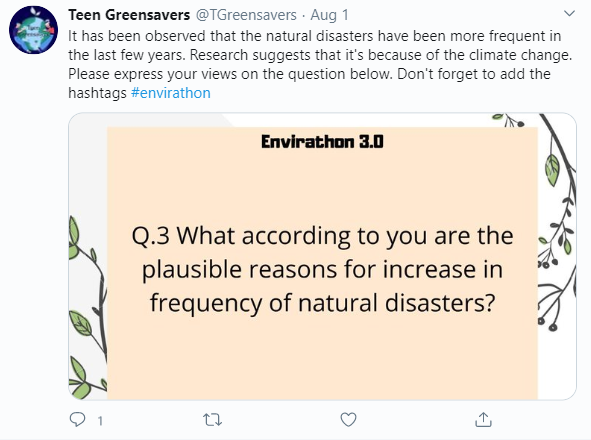Twitter Chat: A platform for the discussing the consequences of our actions
- Teen Greensavers

- Sep 30, 2020
- 2 min read
Updated: Dec 22, 2020
Saving our environment is the need of the hour. Considering the same, we hosted a Twitter chat, inviting opinions on ill waste management in water bodies and the threat posed by human species to them. A Twitter chat was held on the 13th and 14th of June 2020. The #envirathon articulated ethical questions drawing attention to the practice of non-considerate waste management and its consequences on various aspects of life. It awakened the audience in the concept and its polluting aftermaths. It really was an informative, enlightening, and enriching experience. We strive, for earth is a place worth saving and fighting for. #envirathon
Introduction to topic
Ocean waste is any human-made solid material that is disposed of on beaches or anywhere near the ocean. Dead seaweed, shells, carcasses or other naturally produced materials are not included in this. Floating waste often accumulates in particular regions because of wind patterns and currents and accumulates in all of the major gyres worldwide.
Problems
● Seabirds, turtles, marine mammals and fish can mistake floating trash for food and it can choke them or block their digestive systems.
● Microplastic trash is an additional threat because it absorbs toxic chemicals, including DDT and PCBs, which can cause cancer, weaken the immune system and make animals more susceptible to diseases and other infections.
● Ingestion of plastic trash by many animals can be eaten by humans.
● It increases the risk of cancer and birth defects.
● Ocean decreases the economic value and productivity of coastal regions, particularly in the tourism, recreation, and seafood industries, and creates additional costs.
Solutions
● The Ocean Conservancy has organized ocean clean-ups in 152 countries for the past 25 years.
● Local volunteers walk beaches to collect trash, SCUBA divers collect debris from the ocean floor, and volunteers in boats collect floating debris, yielding staggering amounts of trash.
● Data from these clean ups are used by ocean scientists and can help inform policymakers.













Comments